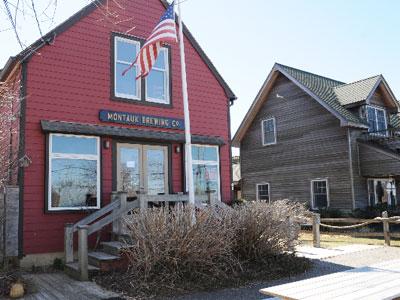Conflict on Montauk Brewery's Parking Fee

Just how far the town board can, or should, go to help a local business grow is the subject of yet another developing disagreement among East Hampton officials.
The founders of the Montauk Brewing Company, three East Hampton High School graduates, have set up a storefront and tasting room in Montauk, on South Erie Avenue just across from the baseball field, and have been working to promote their signature brew, called Driftwood Ale, and other offerings.
The beer has been brewed at an upstate contract brewery, but the beer entrepreneurs, Vaughan Cutillo, Eric Moss, and Joe Sullivan, plan to install brewing equipment in Montauk to make the beer on site.
When they went to the planning board for site plan approval, however, they learned that the addition would trigger a requirement to provide three more parking spaces on the site. With no room on the property to add them, they were told that they could, instead, pay fees in lieu of providing the parking spaces — $15,000 per spot — that the town collects in a fund earmarked for the creation of municipal parking in central business zones where property owners cannot provide the parking that is required for a particular business.
Paying a $45,000 fee, the Montauk brewers have said, would be an impediment. “It’s an enormous expense so far,” Mr. Cutillo said Tuesday, calling the brewery a “boot-strap” business.
The three owners had appealed to the town board several months ago to allow them to use nearby municipal parking, at no cost, to fulfill the additional parking requirement.
The situation is unique, Mr. Cutillo said this week, because of the brewery’s proximity to the public lot by the ball field — which, he said, is not used to capacity. “We’ve had overwhelming support from the community,” he said of the start-up.
At a town board meeting last Thursday night, Councilman Peter Van Scoyoc sponsored a resolution proposing what he saw as a solution to the business’s dilemma, allowing them to amortize the $45,000 fee over a period of years to be determined by the planning board, so as to spread the financial impact over time.
The town board, he said this week, does not have the authority to waive the fees, releasing a particular business from an obligation to abide by the town code.
“Why can’t we just accommodate them and let them use the parking spaces and waive the fee?” Supervisor Bill Wilkinson asked last Thursday. “It’s not a generic retail application. It’s something unique.”
“Is there a fair process for doing that?” Councilman Van Scoyoc asked. “I feel that this is a way, through the existing process, to help them open up their business,” he said of his proposal. Should the board believe the parking fees are unfair, “let’s talk about a code change,” he said, rather than make an exception for one applicant. “It’s called a process that’s fair,” he said.
“We as a town have been unfair to constituents for 30 years,” said Councilwoman Theresa Quigley, She had prepared a resolution of her own, authorizing a license agreement with the brewers that would allow them to use the three public parking spaces.
Both resolutions were tabled after it became clear that the board was in a familiar deadlock, with Mr. Van Scoyoc and his fellow Democratic board member, Sylvia Overton, on one side, Ms. Quigley and Mr. Wilkinson on the other, and Councilman Dominick Stanzione, elected on the Republican slate, remaining mum on the issue.
Mr. Wilkinson then turned to John Jilnicki, the town attorney. “Can I waive these fees tonight, John?” he asked.
“There’s no provision in the code to waive the fees,” Mr. Jilnicki replied. “You’d be subject to challenge if you did that.”
Ms. Quigley pointed out that the board does waive fees for site plan applications and building permits.
She claimed that the town has never used any of the money collected for the parking fund — a total of $81,109 since April 1994. “I don’t understand the purpose of this fee. In 20 years we’ve done nothing with the fee other than punish people.”
“Perhaps we should start using it,” Mr. Van Scoyoc said. “We have a system; it’s structured in a certain way. I think it’s completely unfair to waive the fees for one individual business when we have these regulations in place and everyone prior . . . has had to comply.”
“As far as I’m concerned, the world is structured to make accommodations for people who don’t have money,” Ms. Quigley replied.
Before forwarding the matter for the town board’s decision, the planning board had a similar discussion at a meeting in January. Several expressed support for the fledgling company and interest in helping them. But several warned about bending the rules.
“I can name 10 other applicants who had to pay into it,” said Patrick Schutte, a planning board member, about the municipal parking fund. “I don’t think that legally we can do that, the town board can do that. I don’t think the town board or we can grant an easement on this,” he said.
“If we did it for this business, then we’d have to do it for anybody near municipal parking,” Ian Calder-Piedmonte said at the time.
“We’re thrilled the town’s even willing to work with us, as a small business,” Mr. Cutillo said Tuesday. “I do understand there’s a bigger picture here.”
For the time being, he said, Montauk Brewing’s custom equipment is on hold. Setting up a bonafide brewery has been a “pretty massive project,” he said, stretching over three years. Installing the brewing equipment will take another six to eight months, he said, once the business somehow gets a green light from the town.
Mr. Cutillo said he holds out hope that he can avoid paying the fee. “I hope they can come to some agreement,” he said. “I’m going to be working very hard to move this forward.”
